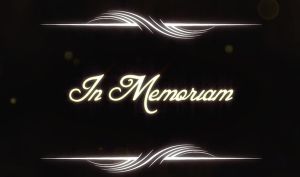 Winning an Emmy may be a big thing for the recipients, but just as important to their loved ones is getting mentioned in the “In Memoriam” segment to mark a lifetime of work.
Winning an Emmy may be a big thing for the recipients, but just as important to their loved ones is getting mentioned in the “In Memoriam” segment to mark a lifetime of work.
This year’s Creative Arts Emmys, which ran Saturday, even had its own “In Memoriam” segment, perhaps as a runover for Sunday’s prime time main event (the question being: Will Judy Carne be recognized at tonight’s event as well?).
Every year there is controversy, usually over who is left out of the somber recognition, and it’s something Emmy producers take seriously, Emmys producer Don Mischer says.
“It’s really one of the tough assignments you’ve got when you are producing these shows,” he told reporters at the TV Critics Association summer press tour last month. “And it’s the same with the Oscars and other shows that have in memoriam packages.”
Such packages began with the Oscars, he said, “when they decided that people who were recognizable to moviegoers around the nation would have a moment to remember those actors and actresses that they lost.
“As an industry show,” Mischer said, “we also feel the need to honor people behind the scenes, producers, great writers, musical directors and so forth. And we do both of those.
“We compile a list, and it’s got hundreds of names on it, and we try and make the best decision we can knowing that we’ve got about three and a half to four minutes or three minutes and 45 seconds to actually do this piece.”
It’s important to make the right call, he said. “I can tell you, having done the Emmys many times, it’s very tough to get the phone calls from the families and the sons and daughters of people who have who left us during the year. And we are contacted frequently about people hoping that their loved one can be remembered. And it’s difficult. And it’s not perfect. But we make the best decisions we can make under the circumstances.”
Does that mean loved ones campaign to get in the segment? he was asked.
“I wouldn’t call it campaigning,” Mischer said. “I think it’s just letters, heartfelt letters from survivors and relatives, primarily immediate family, saying, ‘I hope you are able to include my father and or my mom or my brother or whatever.’
That doesn’t necessarily sway him, he said.
“No. I don’t think it’s a matter of the campaigning,” Mischer said. “We have many people who look at this list from different points of view. The Academy is a heavy participant in it. And we do due diligence, and we’re way into that process already. And we hope that we make the best decisions. It’s difficult.”
“It’s an impossible job,” says host Andy Samberg. “There’s no way to quantify any individual’s life against another’s. I mean, I would imagine in the end, you have to go with recognizability.”
And then there are the people who clap a lot for somebody, and don’t clap at all for someone else.
But, Mischer said, “generally, in the commercial break preceding in memoriam, will ask people to kindly hold their applause out of respect to everyone who is in the in memoriam section until after the last picture fades out.
“For me personally as a producer, it has bothered me that there are people watching this at home where some people get this much applause, some people get this much applause, some people get no applause,” he said. ” I mean, if people applaud, there’s nothing we can do about it. But I just feel like it’s fairer to all the people that happen to be in that in memoriam.”
They could kill the microphones in the audience, it has been suggested.
“Yeah, you probably could,” he said. “We don’t.”
“We just hope people feel it,” Mischer says. “And generally speaking, I think that anytime we’ve done that, people have respected that and understood.”